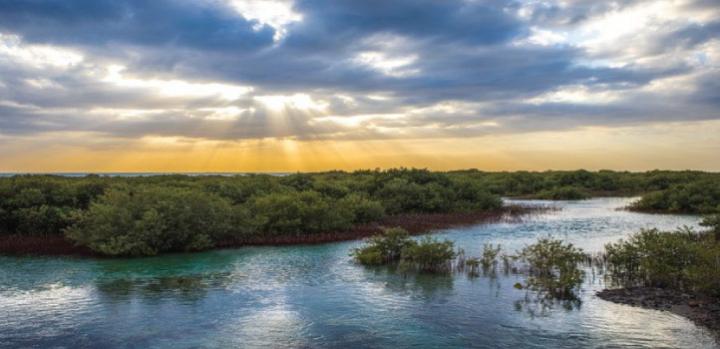
Credit: © 2020 Morgan Bennett Smith
High levels of dissolved calcium carbonate present in their bedrock indicate that Red Sea mangroves are capable of removing more carbon than previously thought, KAUST researchers have found. The study’s findings highlight the need to consider calcium carbonate dissolution in mangroves growing on carbonate platforms as an important carbon storage mechanism.
Blue carbon ecosystems, such as mangroves, saltmarshes and seagrass beds, sequester large amounts of carbon dioxide (CO2) from the atmosphere in the form of organic carbon locked in their soils. In the Red Sea and much of the tropics, mangroves grow on calcium carbonate sediments formed by shells and skeletons of marine organisms dating back to the Pleistocene, about one hundred thousand years ago. The dissolution of calcium carbonate in seawater is a source of total alkalinity, which increases the ocean’s capacity to store CO2 from the atmosphere.
Previous research has found that the relatively small mangroves of the Red Sea bury ten times less organic carbon in their sediments than the global average for mangroves. These studies, however, did not examine dissolved calcium carbonate as a carbon sink — a concept that had been previously hypothesized but not quantified, until now.
“As the ocean becomes more acidic due to climate change, more calcium carbonate is dissolved in the oceans. This isn’t good news, because ocean acidification is a global threat to coral reefs,” says Vincent Saderne, a research scientist in KAUST. “But this dissolution also increases the ocean’s capacity to dissolve CO2, creating a feedback effect that helps mitigate climate warming. It’s quite understudied.”
Using incubation chambers, the team measured the total alkalinity emission rates present in a mangrove swamp in the central Red Sea, Saudi Arabia. They compared these measurements with those taken in a nearby lagoon that had no vegetation.
They found that total alkalinity was significantly higher in the mangrove swamp than in the lagoon, regardless of the season, time of day or the presence of root structures. The calculated alkalinity emission rates were also much higher than those reported by previous studies on mangroves in Australia. The alkalinity released displaces the equilibrium in seawater to permanently convert CO2 into bicarbonate.
The researchers also estimated that the mangrove site stores 13 tons of CO2 per hectare each year, a 23-fold increase on previous estimates that focused solely on organic carbon burial in soils.
“Our results now identify mangroves in the Red Sea, and possibly those in other carbonate basins, as a powerful solution to mitigate climate change,” says Carlos Duarte, professor of marine science and co-author of the study. “The findings contribute to the Circular Economy National Program of Saudi Arabia by identifying a significant option for removing CO2.”
###
Media Contact
Michael Cusack
[email protected]
Original Source
https:/
Related Journal Article
http://dx.




